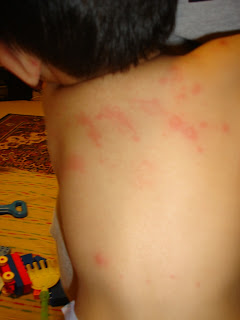Fostering a Culture of Inclusion in Schools
It's that time again... Back to School!
I, for one, relish the newly found silence in my home in the afternoon. I am also happy in the confidence that my boys are learning and playing and enjoying school again. I like knowing that the sweltering days of summer will soon transition into pleasant autumn evenings.
However, I know that back to school season brings on very different emotions for parents of children with life-threatening food allergies. These feelings range from fear and anxiety at being separated from a child with medical needs, to frustration with the necessary mounds of paperwork that constitute school health forms, and apprehension about what some might term "the little things": Will my child have someone to sit with at lunch? What if someone at the middle school starts a food fight, and throws a PB& J? How will my 5 year old handle it, when at the end of a long day of kindergarten, a classmate shares cupcakes with everyone as a birthday treat (everyone except him)? What will I do if the PTA organizer insists on using an ice cream brand for the open house social that is known to have cross-contamination issues?
In my work as a pediatric allergist, I have come across of a wide variety of ways that children with life-threatening food allergies are excluded in the name of safety. Here are a few examples:
1) A class was rewarded for good behavior by being permitted to eat lunch in the classroom instead of in the lunchroom. When the teacher discovered that a number of children had peanut or tree nuts in their lunches, my patient's desk was pushed into the corner of the room to keep him separated from the allergens. Classmates were rewarded. He was punished.
2) A teacher mentioned to a mom that it might be a good idea if a tree nut-allergic student remain home on the day of the field trip, as there would be walnut trees in the park they were planning to visit, and the teacher couldn't guarantee that a chaperone would be able to monitor the student closely enough for the teacher's comfort.
3) A student with a food allergy was identified by name in a letter that went home to parents stating that only fruits and vegetables could be sent as snacks or treats into the classroom. This resulted in a classmate stating to my patient, "My mom says it's your fault that we can't have any good food for the holiday party, and you should just be home-schooled."
The common thread in these scenarios is that each child was isolated or excluded. Now, don't get all up in a knot saying, "They are going to have to learn how to go without eventually!"
Parents of kids with food allergies understand that their kids will one day have to learn that part of the reality of living with allergy is that you can't always have what other people are having. We start teaching that as soon as they are old enough to understand the concept. As children grow older, this is continually reinforced by families and health care professionals. We teach kids to advocate for themselves.
Young children, however, deserve to learn in an environment that is not only safe, but also as inclusive as possible. Sitting alone at lunch, being the only kid who gets a bag of crackers instead of a cupcake, having to miss out on special activities, leaving the soccer game before the snack, being identified as the reason for other children's "deprivation" - these things add up very quickly in the psyche of a young child and create a profound sense of otherness. It IS worth the extra effort it takes to develop non-food rewards and celebrations. It IS worth the extra thought required to ensure that we aren't just keeping our kids physically healthy, but also emotionally healthy.
It takes a village to raise a child. It takes many arms to envelop children in a circle of safety and acceptance. It takes the strength of many to lift our children up so they can look to the future and envision possibilities beyond the immediate.
So, when you are planning that holiday party, or open house event, or fundraiser, or field trip - please ask yourself, "Am I doing everything I can to ensure that all the children in the school feel equally valued and worthy?"
It may just be something on your task list, but to a kid, it can mean the world.
I, for one, relish the newly found silence in my home in the afternoon. I am also happy in the confidence that my boys are learning and playing and enjoying school again. I like knowing that the sweltering days of summer will soon transition into pleasant autumn evenings.
However, I know that back to school season brings on very different emotions for parents of children with life-threatening food allergies. These feelings range from fear and anxiety at being separated from a child with medical needs, to frustration with the necessary mounds of paperwork that constitute school health forms, and apprehension about what some might term "the little things": Will my child have someone to sit with at lunch? What if someone at the middle school starts a food fight, and throws a PB& J? How will my 5 year old handle it, when at the end of a long day of kindergarten, a classmate shares cupcakes with everyone as a birthday treat (everyone except him)? What will I do if the PTA organizer insists on using an ice cream brand for the open house social that is known to have cross-contamination issues?
In my work as a pediatric allergist, I have come across of a wide variety of ways that children with life-threatening food allergies are excluded in the name of safety. Here are a few examples:
1) A class was rewarded for good behavior by being permitted to eat lunch in the classroom instead of in the lunchroom. When the teacher discovered that a number of children had peanut or tree nuts in their lunches, my patient's desk was pushed into the corner of the room to keep him separated from the allergens. Classmates were rewarded. He was punished.
2) A teacher mentioned to a mom that it might be a good idea if a tree nut-allergic student remain home on the day of the field trip, as there would be walnut trees in the park they were planning to visit, and the teacher couldn't guarantee that a chaperone would be able to monitor the student closely enough for the teacher's comfort.
3) A student with a food allergy was identified by name in a letter that went home to parents stating that only fruits and vegetables could be sent as snacks or treats into the classroom. This resulted in a classmate stating to my patient, "My mom says it's your fault that we can't have any good food for the holiday party, and you should just be home-schooled."
The common thread in these scenarios is that each child was isolated or excluded. Now, don't get all up in a knot saying, "They are going to have to learn how to go without eventually!"
Parents of kids with food allergies understand that their kids will one day have to learn that part of the reality of living with allergy is that you can't always have what other people are having. We start teaching that as soon as they are old enough to understand the concept. As children grow older, this is continually reinforced by families and health care professionals. We teach kids to advocate for themselves.
Young children, however, deserve to learn in an environment that is not only safe, but also as inclusive as possible. Sitting alone at lunch, being the only kid who gets a bag of crackers instead of a cupcake, having to miss out on special activities, leaving the soccer game before the snack, being identified as the reason for other children's "deprivation" - these things add up very quickly in the psyche of a young child and create a profound sense of otherness. It IS worth the extra effort it takes to develop non-food rewards and celebrations. It IS worth the extra thought required to ensure that we aren't just keeping our kids physically healthy, but also emotionally healthy.
It takes a village to raise a child. It takes many arms to envelop children in a circle of safety and acceptance. It takes the strength of many to lift our children up so they can look to the future and envision possibilities beyond the immediate.
So, when you are planning that holiday party, or open house event, or fundraiser, or field trip - please ask yourself, "Am I doing everything I can to ensure that all the children in the school feel equally valued and worthy?"
It may just be something on your task list, but to a kid, it can mean the world.



Comments
Post a Comment
Thanks for taking the time to comment on this blog's posts! Let's keep the discussion engaging and free of frivolous advertising or vulgarity. It's a family show, folks!